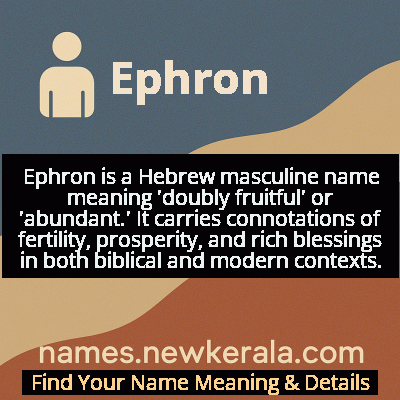Ephron Name Meaning & Details
Origin, Popularity, Numerology Analysis & Name Meaning of Ephron
Discover the origin, meaning, and cultural significance of the name EPHRON. Delve into its historical roots and explore the lasting impact it has had on communities and traditions.
Name
Ephron
Gender
Male
Origin
Hebrew
Lucky Number
4
Meaning of the Name - Ephron
Ephron is a Hebrew masculine name meaning 'doubly fruitful' or 'abundant.' It carries connotations of fertility, prosperity, and rich blessings in both biblical and modern contexts.
Ephron - Complete Numerology Analysis
Your Numerology Number
Based on Pythagorean Numerology System
Ruling Planet
Uranus (Rahu)
Positive Nature
Strong sense of order, loyal, practical, and disciplined.
Negative Traits
Stubborn, overly serious, rigid, and prone to feeling restricted.
Lucky Colours
Blue, gray.
Lucky Days
Saturday.
Lucky Stones
Blue sapphire.
Harmony Numbers
1, 7, 8.
Best Suited Professions
Managers, engineers, accountants, organizers.
What People Like About You
Dependability, discipline, practicality.
Famous People Named Ephron
Ephron the Hittite
Biblical Figure/Landowner
Sold the Cave of Machpelah to Abraham as a burial site for Sarah
Nora Ephron
Writer/Director
Acclaimed filmmaker known for 'When Harry Met Sally' and 'Sleepless in Seattle'
Henry Ephron
Screenwriter/Playwright
Successful Hollywood screenwriter and father of Nora Ephron
Ephron Catricala
Religious Leader
Influential Seventh-day Adventist minister in the Philippines
Name Variations & International Equivalents
Click on blue names to explore their detailed meanings. Gray names with will be available soon.
Cultural & Historical Significance
Throughout Jewish history, the name has maintained its connection to fertility, abundance, and biblical heritage, while in modern times it gained additional cultural recognition through the prominent Ephron family in American literature and film. The name bridges ancient Middle Eastern history with contemporary Western culture, representing both traditional values and modern creativity. Its dual nature as both a biblical personal name and a modern surname gives it unique cultural resonance across different contexts and time periods.
Extended Personality Analysis
Individuals named Ephron are often perceived as creative, intellectually curious, and possessing strong communication skills. The name carries an artistic and literary aura, particularly in modern contexts, suggesting someone with storytelling abilities and emotional depth. They tend to be observant and perceptive, with a knack for understanding human relationships and social dynamics. The biblical roots of the name suggest qualities of wisdom in negotiation and practical matters, as demonstrated by the original Ephron's business transaction with Abraham.
Ephrons are often seen as grounded yet imaginative individuals who combine traditional values with contemporary thinking. They may exhibit leadership qualities tempered with empathy, and their 'doubly fruitful' meaning suggests people who are productive and bring abundance to their endeavors and relationships. There's often an expectation of intelligence and cultural sophistication associated with the name, particularly given its connection to prominent literary and artistic figures. These individuals are typically viewed as having good judgment in both personal and professional matters, with an ability to navigate complex situations with grace and wisdom.
Modern Usage & Popularity
In contemporary times, Ephron remains a relatively uncommon but distinguished name, primarily used within Jewish communities and among families with strong biblical or literary connections. The name saw increased recognition in the late 20th century due to the fame of the Ephron family in Hollywood and publishing, particularly Nora Ephron's success. While not ranking in popular baby name lists, it maintains a steady presence as a meaningful choice for parents seeking a name with deep historical roots and intellectual connotations. Its usage is more frequent as a surname than a given name, and it often appeals to educated, culturally aware families who appreciate its biblical heritage and literary associations. The name carries an air of sophistication and tradition without being overly common, making it an attractive option for parents seeking something distinctive yet meaningful.
Symbolic & Spiritual Meanings
Symbolically, Ephron represents fertility, abundance, and the fulfillment of promises. The 'doubly fruitful' meaning extends beyond literal reproduction to encompass creative fertility, intellectual abundance, and spiritual richness. It symbolizes successful negotiations and fair exchanges, referencing the biblical land purchase that established sacred ground. The name carries connotations of legacy and permanence, as the Cave of Machpelah became an eternal resting place for patriarchs and matriarchs. It also represents the bridging of cultures, as Ephron the Hittite engaged in a significant transaction with the Hebrew patriarch Abraham. In a broader sense, the name symbolizes the fruitful results of wisdom, patience, and respectful interaction between different peoples and traditions, making it a powerful emblem of cross-cultural understanding and mutual benefit.

